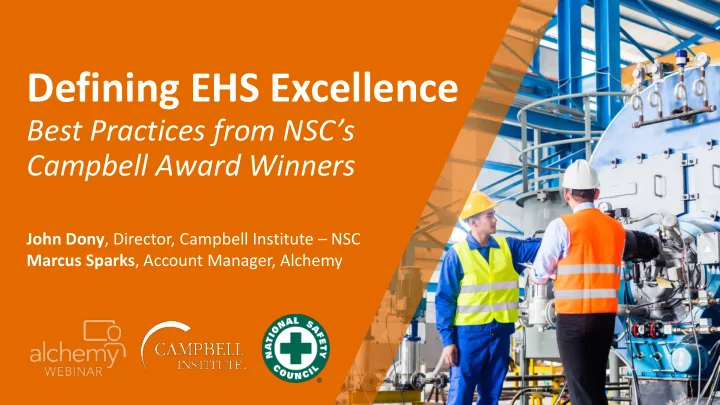

Defining EHS Excellence Best Practices from NSC’s Campbell Award Winners John Dony , Director, Campbell Institute – NSC Marcus Sparks , Account Manager, Alchemy
Today’s Speakers • • John Dony Marcus Sparks • • Director, Campbell Institute - NSC Account Manager 2
Agenda 1. NSC’s Campbell Award 2. Employee Engagement 3. Questions
NSC’s Campbell Award 4
The National Safety Council ELIMINATING PREVENTABLE DEATHS IN OUR LIFETIME 5
Robert W. Campbell “Safety work is today recognized as an economic necessity, and one of the more constructive movements that has ever come into our national life. It is the study of the right way to do things.” 6
Shared Vision 7
The Campbell Award Goals 1. Establish Measurement Process 2. Capture Successes 3. Foster Sharing 4. Recognize EHS Performance 8
Campbell Award Winners 9
Defining Excellence 10
Areas of Excellence 11
Area of Excellence #1 – Leadership LEADERSHIP Empowering all within the organization to lead on EHS
Area of Excellence #1 – Leadership CEO COMMITMENT PERFORMANCE EMPLOYEE EMPOWERMENT LEADERSHIP TRAINING 13
EMPLOYEE EMPOWERMENT 14 Confidential and Prorietary
Empowerment Process • Pre-Stage 1 – Team is learning the work process and roles, Leadership is directing • Stage 1 – Team has begun to explore their empowerment, implementing the relevant work process and developing specific team protocol to guide their empowerment journey, Leadership is guiding • Stage 2 – Team successfully implemented the work process, team and leadership share ownership on all aspects of the team’s work, Leadership is supporting Performance Sustaining • – Stage II with results - meeting their targets, setting improvement records, etc. Shared leadership where leadership plays a role in championing the team’s activities and supporting the team’s effort to maintain the level of achievement 15
Area of Excellence #2 – Integration INTEGRATION Incorporating EHS into all facets of the business 16
Area of Excellence #2 – Integration EHS & BUSINESS INTEGRATION AUDIT PROGRAM ANTICIPATION OF CHALLENGES CONSIDERATION OF CONTRACTED WORKFORCE 17
AUDIT PROGRAM 18 Confidential and Prorietary
Audit Process • First-Party – Self- assessment that provides requirements and guidance that outline a process for conducting a structured EHS audit of a facilities EHS systems • Second-Party – Led by auditors from other internal DuPont sites to provide in-depth and objecting feedback • Third-Party – Run in conjunction with independent organizations who evaluate and prepare reports on the status of accomplishments of both the first and second-party audit results Completed annually and include participants from top leadership to shop-floor personnel 19
Area of Excellence #3 – Data Management DATA MANAGEMENT Gathering and using key performance indicators to monitor EHS Systems 20
Area of Excellence #3 – Data Management IDENTIFYING RISK LEADING & LAGGING METRICS SUSTAINABILITY 21
LEADING & LAGGING METRICS 22
Balanced Scorecard • Steering committee meetings • Gemba walks for leaders • Calendar/permit reviews • Layered reviews • Audit scores • Average days to close corrective actions • Regulatory inspections with and without findings • Waste diversion • Scorecard completion 23
Area of Excellence #4 – Alignment ALIGNMENT Linking EHS goals to other organizational objectives 24
Area of Excellence #4 – Alignment COST BENEFIT ANALYSIS BUSINESS MANAGEMENT REVIEW OF ACQUISITIONS OPERATIONAL READINESS 25
BUSINESS MANAGEMENT 26
The Six S System 27
Area of Excellence #5 – Corporate Citizenship CORPORATE CITIZENSHIP Promoting off-the-job safety & environmental initiatives 28
Area of Excellence #5 – Corporate Citizenships CORPORATE SPONSORSHIP EMPLOYEE CONTRIBUTIONS COMMUNITY OUTREACH HOLISTIC WELLBEING EMPLOYEE RECOGNITION 29
HOLISTIC WELLBEING 30
5 Keys to Successful Wellbeing Programs 1. Involve stakeholders in the development 2. Create a good communication plan 3. Experiment with incentive structures 4. Engage people through organized activities 5. Strongly connect wellbeing with safety 31
32
Employee Engagement 33
The Forgetting Curve The Forgetting Curve 80% of content is forgotten within 30 days when not reinforced 1 Without systematic reinforcement, original training is not applied correctly 1 Ebbinghaus Forgetting Curve 34
Alchemy’s Integrated Solution for Continuous Engagement Alchemy enables “smart action at work” with integrated training , reinforcement , and audit-readiness solutions Compliance Training Reinforcement
A Comprehensive Solution with Continuous Engagement Campbell Award Areas of Excellence Leadership Integration Data Management Training Reinforcement Corporate Citizenship Compliance Alignment 36
#1 Leadership CEO COMMITMENT PERFORMANCE PLANS EMPLOYEE EMPOWERMENT LEADERSHIP TRAINING 37
38
Alchemy Communications Tools 40
Foster Supervisor-Worker Discussions with Huddle Guides 41
#1 Leadership CEO COMMITMENT PERFORMANCE EMPLOYEE EMPOWERMENT LEADERSHIP TRAINING 42
The Alchemy of Leadership: Frontline Leader Development Program Courses Coaching People Skills Modules • Exercises for each modules • Providing Constructive Feedback • Completion signoff • Valuing Differences • Coaching / Communication • Manager tracking of reinforcement • Disciplinary Action • Difficult Conversations Course Pedagogy Consulting • Giving a Performance Evaluation • Providing Feedback • Good First Impression • Provide leadership program development • 10 min max • Handling Complaints • Concept Intro • Teamwork • Cases/examples • Building Trust • • Engaging Employees Knowledge check • How to Delegate • Learning aid Can be used stand-alone or a • Managing Change • Active Listening Skills complement a company’s • Anger Management • Dealing with Difficult People existing development program • Motivating Teams • Demonstrating Leadership • Follow Up and Follow Through
#3 Data Management IDENTIFYING RISK LEADING & LAGGING METRICS SUSTAINABILITY 44
2016 EHS National Safety Survey 45
Coach: Capture Data & Optimize Performance • Foster positive on-the-job supervisor to employee interactions • Ensure compliance of GMPs, work instructions, JHAs and other safety requirements • Document and track corrective actions • Capture and sign off for on-the-job trainings 46
Alchemy Drives Behavioral Change 100% 80% “People do what 60% you inspect , not what you expect .” 40% – Louis Gerstner, Jr., IBM 20% 0% Pre-Training Post-Training After 3 Observations 47 Source: “The Positive Impact of Behavioral Change on Food Safety & Productivity,” Robert Meyer
The evolution of Coach Observe Observe Train On Take One Many The Floor Attendance Employee Employees 48
Questions? 49
THANK YOU
Recommend
More recommend